Books I think you’ll enjoy (besides mine)…
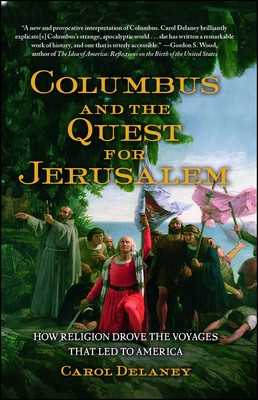 Columbus and the Quest for Jerusalem: How Religion Drove the Voyages That Led to America,
Columbus and the Quest for Jerusalem: How Religion Drove the Voyages That Led to America,
by Carol Delaney – If you want to move past the regrettable caricatures of Columbus that have become vogue in recent years, read this book. Carol Delaney delves into actual primary sources to paint a new interpretation of the man and his mission, arguing that Columbus was inspired to find a western route to China not only on a quest for gold for the Spanish crown, but also to fund a new crusade to take Jerusalem back from the Muslims and into Christian hands before judgment day. Delaney depicts Columbus as an outstanding navigator (he made four voyages without knowledge or benefit of longitude), and a thoughtful interpreter of native cultures, though also as an ineffective governor whose men often defied his wishes when it came to the treatment of indigenous peoples. The book also shows Columbus in the context of his times rather than through the prism of present-day perspectives. It’s a thoughtful, well-researched, and well-written book that is very much worth a read!
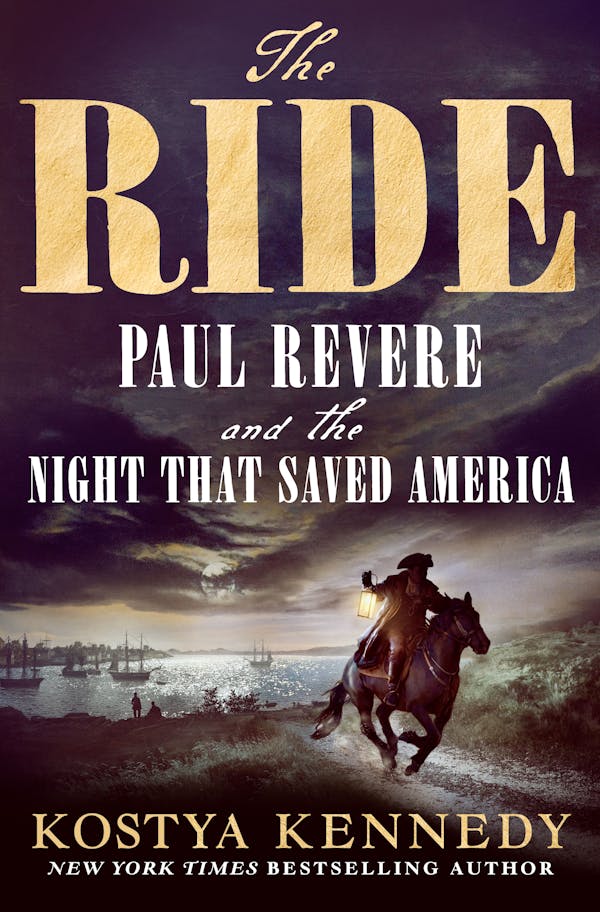 The Ride: Paul Revere and the Night That Saved America, by Kostya Kennedy – I’ve read lots about Paul Revere’s ride and the beginning of the American Revolution, and each time I do, I learn something new. This book is no exception. Kennedy does a great job drawing and explaining the “man who was Paul Revere,” and placing him in the middle of the breathtaking events that led to his historic and iconic ride on the night of April 18, 1775, and the morning of the 19th. Kennedy also places into historical context Revere’s relationship with other colonial leaders – John Hancock, Samuel Adams, William Dawes, Dr. Joseph Warren and others – who helped set in motion the events that would ultimately lead to America’s independence. This year, 2025, is the 250th anniversary of “The Ride,” but if you can’t squeeze it in before year’s end, it’s a good book to kick off 2026, the 250th of the country declaring its independence from England.
The Ride: Paul Revere and the Night That Saved America, by Kostya Kennedy – I’ve read lots about Paul Revere’s ride and the beginning of the American Revolution, and each time I do, I learn something new. This book is no exception. Kennedy does a great job drawing and explaining the “man who was Paul Revere,” and placing him in the middle of the breathtaking events that led to his historic and iconic ride on the night of April 18, 1775, and the morning of the 19th. Kennedy also places into historical context Revere’s relationship with other colonial leaders – John Hancock, Samuel Adams, William Dawes, Dr. Joseph Warren and others – who helped set in motion the events that would ultimately lead to America’s independence. This year, 2025, is the 250th anniversary of “The Ride,” but if you can’t squeeze it in before year’s end, it’s a good book to kick off 2026, the 250th of the country declaring its independence from England.
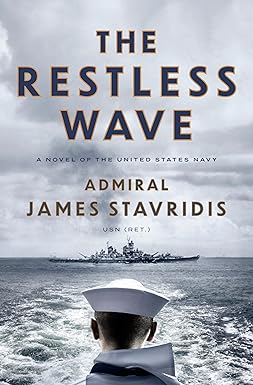 The Restless Wave (historical fiction special), by Admiral James Stavridis, USN (Ret.) – Closing out my recommendations for this issue with this novel of the United States Navy. The book’s main character, Scott Bradley James, arrives at Annapolis as a plebe in the U.S. Naval Academy’s class of 1941. The story follows him, his friends, and his girlfriend as tensions with the Japanese reach a boiling point, and then through the attack on Pearl Harbor, Midway, and Guadalcanal. It’s really a gripping account of the Navy during the first three years of the war. Kennedy is working on another novel that follows Scott James through the war. I liked both the fictional story and the very accurate historical portrayal of big events that are interwoven in this excellent book.
The Restless Wave (historical fiction special), by Admiral James Stavridis, USN (Ret.) – Closing out my recommendations for this issue with this novel of the United States Navy. The book’s main character, Scott Bradley James, arrives at Annapolis as a plebe in the U.S. Naval Academy’s class of 1941. The story follows him, his friends, and his girlfriend as tensions with the Japanese reach a boiling point, and then through the attack on Pearl Harbor, Midway, and Guadalcanal. It’s really a gripping account of the Navy during the first three years of the war. Kennedy is working on another novel that follows Scott James through the war. I liked both the fictional story and the very accurate historical portrayal of big events that are interwoven in this excellent book.
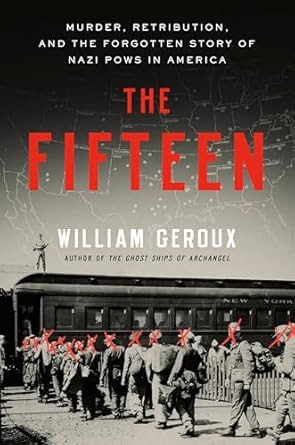 The Fifteen: Murder, Retribution, and the Forgotten Story of Nazi POWs in America, by William Geroux – I really enjoyed this book because it brought to light a little-known aspect of the Second World War. During the war, some 400,000 German POWs were housed in hundreds of hastily built camps in the United States. They were well-fed, many worked on American farms, and some would even marry young women who lived on those farms. However, ardent Nazis in the camp took a dim view of fellow Germans who befriended their captors or even simply spoke negatively about the Nazi regime. In camp after camp, Nazis attacked and often killed fellow Germans they deemed disloyal to Hitler and the Third Reich. Fifteen of these killers were convicted and sentenced to death by secret U.S. military tribunals for acts of murder. In response, German authorities condemned fifteen American POWs to the same fate, most for minor or non-existent crimes. In the waning days of the war, as it faced certain defeat, Germany proposed a trade: 15 German lives in exchange for 15 American lives. I’ll stop there – although this story is 100 percent true, there is a mysterious quality to the ending. I’d rather not give it away!
The Fifteen: Murder, Retribution, and the Forgotten Story of Nazi POWs in America, by William Geroux – I really enjoyed this book because it brought to light a little-known aspect of the Second World War. During the war, some 400,000 German POWs were housed in hundreds of hastily built camps in the United States. They were well-fed, many worked on American farms, and some would even marry young women who lived on those farms. However, ardent Nazis in the camp took a dim view of fellow Germans who befriended their captors or even simply spoke negatively about the Nazi regime. In camp after camp, Nazis attacked and often killed fellow Germans they deemed disloyal to Hitler and the Third Reich. Fifteen of these killers were convicted and sentenced to death by secret U.S. military tribunals for acts of murder. In response, German authorities condemned fifteen American POWs to the same fate, most for minor or non-existent crimes. In the waning days of the war, as it faced certain defeat, Germany proposed a trade: 15 German lives in exchange for 15 American lives. I’ll stop there – although this story is 100 percent true, there is a mysterious quality to the ending. I’d rather not give it away!
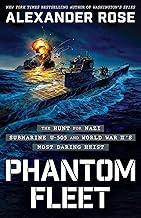 Phantom Fleet: The Hunt for Nazi Submarine U-505 and World War II’s Most Daring Heist, by Alexander Rose – There were lots of reasons I enjoyed this book, not the least of which is it featured as one of its major real-life characters Kenneth Knowles, who I also featured in my book, Due to Enemy Action. Knowles ran the sub-tracking secret room in Washington D.C. during World War II, which tracked German U-boats prowling the East Coast of the U.S. In this book, Knowles helps U.S. Navy Captain Dan Gallery locate the U-505 to do something amazing – steal a German Enigma machine for Knowles, which will help the Allies break German codes. Gallery’s job was to make an entire U-boat, its crew, and its secrets vanish into thin air. Read this book to find out how Gallery and his crew fared!
Phantom Fleet: The Hunt for Nazi Submarine U-505 and World War II’s Most Daring Heist, by Alexander Rose – There were lots of reasons I enjoyed this book, not the least of which is it featured as one of its major real-life characters Kenneth Knowles, who I also featured in my book, Due to Enemy Action. Knowles ran the sub-tracking secret room in Washington D.C. during World War II, which tracked German U-boats prowling the East Coast of the U.S. In this book, Knowles helps U.S. Navy Captain Dan Gallery locate the U-505 to do something amazing – steal a German Enigma machine for Knowles, which will help the Allies break German codes. Gallery’s job was to make an entire U-boat, its crew, and its secrets vanish into thin air. Read this book to find out how Gallery and his crew fared!
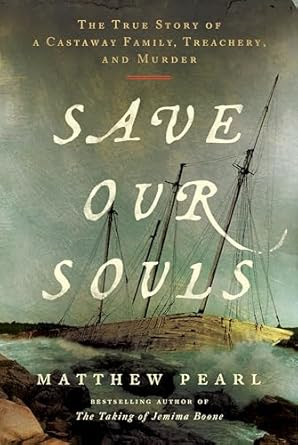 Save Our Souls: The True Story of A Castaway Family, Treachery, and Murder, by Matthew Pearl – On December 10, 1887, a shark-fishing boat disappeared. On board the doomed vessel were the Walkers – the ship’s captain, Frederick; his wife, Elizabeth; their three teenage sons; their dog – and the ship’s crew. A terrible storm split their boat in two and left those on board adrift in a raging sea. When the castaways awoke the next morning, they discovered they had been washed ashore on an island inhabited by a man named Hans. He is helpful at first and educates the Walkers about the island. But Hans has a secret…and the Walker family soon learns they are in danger. I enjoyed this book a lot, both the historical aspects and the mystery-story feel of the narrative. It’s also the only known instance in history of an actual family of castaways.
Save Our Souls: The True Story of A Castaway Family, Treachery, and Murder, by Matthew Pearl – On December 10, 1887, a shark-fishing boat disappeared. On board the doomed vessel were the Walkers – the ship’s captain, Frederick; his wife, Elizabeth; their three teenage sons; their dog – and the ship’s crew. A terrible storm split their boat in two and left those on board adrift in a raging sea. When the castaways awoke the next morning, they discovered they had been washed ashore on an island inhabited by a man named Hans. He is helpful at first and educates the Walkers about the island. But Hans has a secret…and the Walker family soon learns they are in danger. I enjoyed this book a lot, both the historical aspects and the mystery-story feel of the narrative. It’s also the only known instance in history of an actual family of castaways.
 Strangers in Time (historical fiction special), by David Baldacci – London 1944. A city torn apart by German bombs for several years. Fourteen-year-old Charlie Matters, without parents, scrounges to survive, stealing what he needs, living day to day, hoping to reach the age where he will be able to fight the Germans. He meets fifteen-year-old Molly Wakefield, who has just returned to an unrecognizable London. One of millions of British children relocated to the countryside by her wealthy parents, Molly has been away from home for nearly five years; when she returns, she is devastated to learn her parents are no longer there. Charlie and Molly befriend a book-shop owner who is mourning the recent loss of his wife. Together they form a bond, but Ignatius, the bookseller, also is harboring a secret that could put them all in danger. I’ve said too much already! Baldacci, a great storyteller and narrative expert, is at his best here!
Strangers in Time (historical fiction special), by David Baldacci – London 1944. A city torn apart by German bombs for several years. Fourteen-year-old Charlie Matters, without parents, scrounges to survive, stealing what he needs, living day to day, hoping to reach the age where he will be able to fight the Germans. He meets fifteen-year-old Molly Wakefield, who has just returned to an unrecognizable London. One of millions of British children relocated to the countryside by her wealthy parents, Molly has been away from home for nearly five years; when she returns, she is devastated to learn her parents are no longer there. Charlie and Molly befriend a book-shop owner who is mourning the recent loss of his wife. Together they form a bond, but Ignatius, the bookseller, also is harboring a secret that could put them all in danger. I’ve said too much already! Baldacci, a great storyteller and narrative expert, is at his best here!
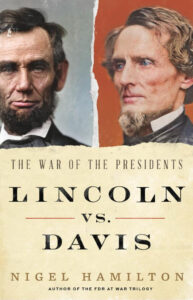 Lincoln vs Davis: The War of the Presidents, by Nigel Hamilton – Reading this wonderful book, I kept asking myself: of all the books written about Abraham Lincoln and the Civil War, why hasn’t this story been told before? And then I answered my own question: because probably no one could tell it as well as Nigel Hamilton. This book is a gem, a beautifully written dramatic narrative of what remains history’s only military face-off between rival American presidents: Lincoln, the U.S. commander-in-chief, and Jefferson Davis, formidable President of the seceded Confederate States of America (CSA). Both men struggle with decisions, generals, strategy, the opinions of foreign government, and the issue at the heart of the war — slavery. At the outset, for his own reasons, neither president wanted the war to be about slavery. Lincoln’s Emancipation Proclamation finally changes that, a policy that ultimately doomed the South. This book is a long one, but the story is gripping and moves fast. If you’re looking for a book to sink your teeth into, it’s this one!
Lincoln vs Davis: The War of the Presidents, by Nigel Hamilton – Reading this wonderful book, I kept asking myself: of all the books written about Abraham Lincoln and the Civil War, why hasn’t this story been told before? And then I answered my own question: because probably no one could tell it as well as Nigel Hamilton. This book is a gem, a beautifully written dramatic narrative of what remains history’s only military face-off between rival American presidents: Lincoln, the U.S. commander-in-chief, and Jefferson Davis, formidable President of the seceded Confederate States of America (CSA). Both men struggle with decisions, generals, strategy, the opinions of foreign government, and the issue at the heart of the war — slavery. At the outset, for his own reasons, neither president wanted the war to be about slavery. Lincoln’s Emancipation Proclamation finally changes that, a policy that ultimately doomed the South. This book is a long one, but the story is gripping and moves fast. If you’re looking for a book to sink your teeth into, it’s this one!
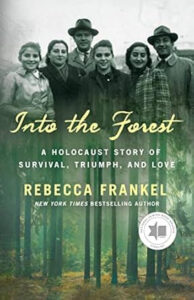 Into the Forest: A Holocaust Story of Survival, Triumph, and Love, by Rebecca Frankel – In the summer of 1942, the Rabinowitz family narrowly escaped the Nazi ghetto in their Polish town by fleeing to the forbidding Bialowieza Forest. They miraculously survived two brutal years in the woods — this part of the book is simply riveting, and in many places, heartbreaking — until they were liberated by the Red Army in 1944. During the ghetto massacre, Miriam Rabinowitz rescued a young boy named Philip by pretending he was her son. Nearly a decade later, a chance encounter at a wedding in Brooklyn leads Philip to find the woman who saved him — and he discovers that her daughter Ruth was the love of his life. This story is incredible and serves as a sobering reminder of the hardships and horrors of war and the Holocaust, but also highlights the enduringhuman spirit in the fight for survival.
Into the Forest: A Holocaust Story of Survival, Triumph, and Love, by Rebecca Frankel – In the summer of 1942, the Rabinowitz family narrowly escaped the Nazi ghetto in their Polish town by fleeing to the forbidding Bialowieza Forest. They miraculously survived two brutal years in the woods — this part of the book is simply riveting, and in many places, heartbreaking — until they were liberated by the Red Army in 1944. During the ghetto massacre, Miriam Rabinowitz rescued a young boy named Philip by pretending he was her son. Nearly a decade later, a chance encounter at a wedding in Brooklyn leads Philip to find the woman who saved him — and he discovers that her daughter Ruth was the love of his life. This story is incredible and serves as a sobering reminder of the hardships and horrors of war and the Holocaust, but also highlights the enduringhuman spirit in the fight for survival.
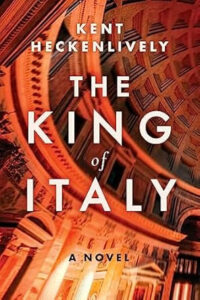 The King of Italy (historical fiction special), by Kent Heckenlively – When he was a young man in the 1920s, Vincenzo Nicosia watches as his father is sent to jail. He blames the Duke du Taormina, the illegitimate son of King Victor Emmanuel II, the unifier of Italy in the 1870s. Vincenzo is approached by Benito Mussolini as part of his plan to take control of Italy. But Vincenzo is betrayed by Mussolini and forced to flee to America. As World War II begins, Vincenzo’s nephew, Alex, volunteers for the U.S. Army. Vincenzo tells Alex, “It’s your mission to kill Mussolini and avenge your family.” I’ll leave it there – this is fiction, of course; thus no need for spoiler alerts. Suffice to say that you will enjoy this story, with all of its twists and turns, and learn some interesting history as well!
The King of Italy (historical fiction special), by Kent Heckenlively – When he was a young man in the 1920s, Vincenzo Nicosia watches as his father is sent to jail. He blames the Duke du Taormina, the illegitimate son of King Victor Emmanuel II, the unifier of Italy in the 1870s. Vincenzo is approached by Benito Mussolini as part of his plan to take control of Italy. But Vincenzo is betrayed by Mussolini and forced to flee to America. As World War II begins, Vincenzo’s nephew, Alex, volunteers for the U.S. Army. Vincenzo tells Alex, “It’s your mission to kill Mussolini and avenge your family.” I’ll leave it there – this is fiction, of course; thus no need for spoiler alerts. Suffice to say that you will enjoy this story, with all of its twists and turns, and learn some interesting history as well!

The Forbidden Garden: The Botanists of Besieged Leningrad and Their Impossible Choice, by Simon Parkin – This book stunned me. I knew a great deal about the horrific siege of Leningrad during World War II, when the Nazis encircled the Russian city for more than 900 days (the longest siege in recorded history), resulting in hundreds of thousands of deaths, most by starvation. What I did not know was that Leningrad was the site of an enormous seed bank — with more than 250,000 samples hand-collected from all over the world by geneticist and dissident Nikolai Vavilov. He and his botanists believed the seeds could be bred into hearty, disease-resistantplants more suited for harsh climates, thereby preventing famines that had plagued Russia for decades, even centuries. When the Germans cut off Leningrad, and the ghastly starvation begins, the caretaker botanists are faced with an impossible choice: do they preserve the seeds for the future of Russia? Or distribute the seeds — and eat the seeds themselves — to avoid imminent starvation. Simon Parkin does a wonderful job intertwining these two narratives: the dilemma of the seed bank scientists, and the suffering of the people of Leningrad as the siege is destroying their city. Vavilov’s story is also part of the narrative in this great book.
 Americans in a World at War: Intimate Histories from the Crash of Pan Am’s Yankee Clipper, by Brooke L. Blower – On February 21, 1943 – right in the middle of World War II – Pan American Airways’ celebrated seaplane, the Yankee Clipper, took off from New York’s Marine Air Terminal at LaGuardia Airport, and island-hopped its way across the Atlantic Ocean. Arriving in Lisbon the following evening, it crashed in the Tagus River, killing 24 of its 39 passengers. Author Brook L. Blower, a history professor at Boston University, does a terrific job tracing the backstories of seven Americans aboard the luxuriously outfitted plane (often referred to as a “flying boat”), their personal histories, their politics, and the paths that led them toward war. She uncovers the surprising history of American noncombatants abroad leading up to the war, and how they shaped (and were transformed by) the U.S. war effort. All the while, the narrative leads to the disastrous crash. This book captured my interest from the beginning – it served as a constant reminder of how epic World War II was and the enormous impact it had on people’s lives.
Americans in a World at War: Intimate Histories from the Crash of Pan Am’s Yankee Clipper, by Brooke L. Blower – On February 21, 1943 – right in the middle of World War II – Pan American Airways’ celebrated seaplane, the Yankee Clipper, took off from New York’s Marine Air Terminal at LaGuardia Airport, and island-hopped its way across the Atlantic Ocean. Arriving in Lisbon the following evening, it crashed in the Tagus River, killing 24 of its 39 passengers. Author Brook L. Blower, a history professor at Boston University, does a terrific job tracing the backstories of seven Americans aboard the luxuriously outfitted plane (often referred to as a “flying boat”), their personal histories, their politics, and the paths that led them toward war. She uncovers the surprising history of American noncombatants abroad leading up to the war, and how they shaped (and were transformed by) the U.S. war effort. All the while, the narrative leads to the disastrous crash. This book captured my interest from the beginning – it served as a constant reminder of how epic World War II was and the enormous impact it had on people’s lives.
 81 Days Below Zero: The Incredible Survival Story of a World War II Pilot in Alaska’s Frozen Wilderness, by Brian Murphy (with Toula Vlahou) – This is my third World War II related recommendation, but again, in a reminder of the global nature and scope of the war, it takes place in a completely different theater: Alaska. Shortly before Christmas in 1943, five Army aviators left Alaska’s Ladd Field on a routine test flight to test their hastily retrofitted B-24 Liberator bomber in harsh winter conditions. The mission ended in a crash that claimed the lives of all but one – Leon Crane, a city kid from Philadelphia with no wilderness experience. Equipped with little more than a parachute for cover and an old Boy Scout knife in his pocket, Crane is alone in subzero temperatures – this book recounts his incredible 12-week saga. Author Brian Murphy also weaves a second story into the braided narrative – the 21st century efforts to recover the remains of the pilot who sat beside Crane in the cockpit, Second Lieutenant Harold E. Hoskin. Above all else, this book is about the limits of human endurance and our indomitable will to survive.
81 Days Below Zero: The Incredible Survival Story of a World War II Pilot in Alaska’s Frozen Wilderness, by Brian Murphy (with Toula Vlahou) – This is my third World War II related recommendation, but again, in a reminder of the global nature and scope of the war, it takes place in a completely different theater: Alaska. Shortly before Christmas in 1943, five Army aviators left Alaska’s Ladd Field on a routine test flight to test their hastily retrofitted B-24 Liberator bomber in harsh winter conditions. The mission ended in a crash that claimed the lives of all but one – Leon Crane, a city kid from Philadelphia with no wilderness experience. Equipped with little more than a parachute for cover and an old Boy Scout knife in his pocket, Crane is alone in subzero temperatures – this book recounts his incredible 12-week saga. Author Brian Murphy also weaves a second story into the braided narrative – the 21st century efforts to recover the remains of the pilot who sat beside Crane in the cockpit, Second Lieutenant Harold E. Hoskin. Above all else, this book is about the limits of human endurance and our indomitable will to survive.
 The Mistress and the Key (fiction special), by Ben Mezrich – In a historical mystery with implications that could transform the world, this book deals with secrets of Paul Revere and Benjamin Franklin, and follows a thread that connects historical documents and locations in Philadelphia, Paris, London, and New York. This novel reminded me of a cross between National Treasure and The DaVinci Code. Author Ben Mezrich, who is a bestselling nonfiction author, does a great job with this fiction narrative too! I’ll say no more…enjoy this read!
The Mistress and the Key (fiction special), by Ben Mezrich – In a historical mystery with implications that could transform the world, this book deals with secrets of Paul Revere and Benjamin Franklin, and follows a thread that connects historical documents and locations in Philadelphia, Paris, London, and New York. This novel reminded me of a cross between National Treasure and The DaVinci Code. Author Ben Mezrich, who is a bestselling nonfiction author, does a great job with this fiction narrative too! I’ll say no more…enjoy this read!
Marching Home: Union Veterans and Thei r Unending Civil War, by Brian Matthew Jordan – I bought this book while on a road-trip in Wilmington, North Carolina, and I’m so glad I did! It is, at once, compelling, haunting, revelatory, and a great read. I was not fully aware of the real struggles that thousands of Union veterans had upon their return from war. Whereas Confederates fought mostly on their own land, literally battling to protect their homes and way of life — which helped them attain heroic stature with Southern civilians — Union vets returned home to a region where the war was mostly abstract and even glorified. The sight of thousands of wounded Union soldiers, many of them amputees, was abhorrent to many Northern civilians, whose desire was to move on from war rather than be constantly reminded of it. Union veterans suffered most from this attitude. This is a book worth reading as yet another stark reminder of the lasting impact of the Civil War.
r Unending Civil War, by Brian Matthew Jordan – I bought this book while on a road-trip in Wilmington, North Carolina, and I’m so glad I did! It is, at once, compelling, haunting, revelatory, and a great read. I was not fully aware of the real struggles that thousands of Union veterans had upon their return from war. Whereas Confederates fought mostly on their own land, literally battling to protect their homes and way of life — which helped them attain heroic stature with Southern civilians — Union vets returned home to a region where the war was mostly abstract and even glorified. The sight of thousands of wounded Union soldiers, many of them amputees, was abhorrent to many Northern civilians, whose desire was to move on from war rather than be constantly reminded of it. Union veterans suffered most from this attitude. This is a book worth reading as yet another stark reminder of the lasting impact of the Civil War.
 Taking London: Winston Churchill and the Fight to Save Civilization, by Martin Dugard – Great Britain, summer 1940. The Battle of France is over, and The Battle of Britain is about to begin. Adolf Hitler’s powerful armies have swept across Europe with little resistance and now control most of the continent. England stands alone against the Nazi juggernaut and new Prime Minister Winston Churchill has vowed never to surrender and defeat Germans at all costs. To begin, he must rely on a small group of elite pilots in the Royal Air Force (RAF) Fighter Command. This book focuses on the inexplicable bravery of the pilots and the indomitable will of Churchill – together they rallied the British people against all odds to turn the tide against the Nazi menace. Dugard’s follow-up to Taking Paris is a reminder of why Churchill is considered one of the great wartime leaders in all of history. I thoroughly enjoyed this book and was reminded again of how “England stood alone” during this critical period early in the war before the U.S. became involved after the attack on Pearl Harbor.
Taking London: Winston Churchill and the Fight to Save Civilization, by Martin Dugard – Great Britain, summer 1940. The Battle of France is over, and The Battle of Britain is about to begin. Adolf Hitler’s powerful armies have swept across Europe with little resistance and now control most of the continent. England stands alone against the Nazi juggernaut and new Prime Minister Winston Churchill has vowed never to surrender and defeat Germans at all costs. To begin, he must rely on a small group of elite pilots in the Royal Air Force (RAF) Fighter Command. This book focuses on the inexplicable bravery of the pilots and the indomitable will of Churchill – together they rallied the British people against all odds to turn the tide against the Nazi menace. Dugard’s follow-up to Taking Paris is a reminder of why Churchill is considered one of the great wartime leaders in all of history. I thoroughly enjoyed this book and was reminded again of how “England stood alone” during this critical period early in the war before the U.S. became involved after the attack on Pearl Harbor.

Targeted Beirut: The 1983 Marine Barracks Bombing and the Untold Origin Story of the War on Terror, by JackCarr and James M. Scott – October 23, 1983 – the United States Marine Corps experienced its greatest single-day loss of life since the Battle of Iwo Jima when a terrorist drove a truck packed with explosives into their headquarters and barracks in Beirut, Lebanon. The horrible attack killed 241 servicemen, continues to influence U.S. foreign policy, and haunts the Marine Corps to this day. Jack Carr, a former Navy SEAL sniper and bestselling fiction author (including the highly acclaimed The Terminal List) and history author James M. Scott do an outstanding job of outlining terrorist factions and activities (the U.S. embassy in Beirut was bombed six months earlier), politics, and diplomatic and leadership failures that left these brave Marines as sitting ducks with no clear mission in one of the world’s most violent regions. This book was thoughtful and well written, but made me angry at the same time – such a terrible waste of America’s best and bravest.
